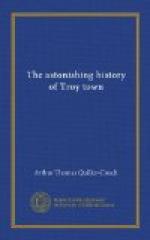There was a pause as they walked along together.
“The board shall come down,” said he; “and now may I carry your basket?”
“My basket? Do you think I’d trust a man to carry eggs?” She laughed, but with a trace of forgiveness.
He did not answer, but seemed to have fallen into a fit of troubled contemplation. They walked on in silence.
Presently she halted.
“I doubt you’ve had trouble in your time, and I’ve hurt your feelings and spoken as I oughtn’t to have spoken to my betters; but I’ve seen that Peter and Paul were hurt in mind, and that made me say more than I meant. Yonder’s your way down to Kit’s House. Good-night, sir.”
Mr. Fogo would have held out his hand, but she was gone quickly down the road. He stood for a minute looking after her; then turned and walked quickly down the path to Kit’s House.
Caleb met him at the door.
“So you’m back, an’ I hopes you enj’yed your walk, as Sal said when her man comed home from France. I was just a-comin’ to luk for ’ee. Where’s your easy-all and your umbrella?”
Mr. Fogo told his story.
“H’m!” said Caleb, “an’ Tamsin saw ’ee home?”
“Yes; and by the way, Caleb, you may as well take down that notice to-morrow.”
“H’m!” muttered Caleb again. “You’re quite sure thicky coddysel won’t do?”
“Quite.”
“Very well, sir,” said Caleb, and began to busy himself with the evening meal. But he looked curiously at his master more than once during the evening. Mr. Fogo spent most of his time in a brown study, smoking and gazing abstractedly into the fire. Caleb also smoked (it was one of his privileges), and finally, with an anxious glance, and two or three hard puffs at his pipe, broke the silence—
“The bull es a useful animal, an’ when dead supplies us wi’ rump-steaks an’ shoe-horns, as the Sunday-school book says: but for all that there’s suthin’ lackin’ to a bull. ’Tain’t conviction: you niver seed a bull yet as wasn’ chuck-full o’ conviction, an’ didn’ act up to hes rights, such as they be. An’ ’tain’t consistency: you drill a notion into a bull’s head an’ fix et, an’ he’ll save et up, may be for six year, an’ then rap et out on ’ee till you’m fairly sick for your own gad-about ways. ’Tes logic he wants, I reckon—jest logic. A bull, sir, es no more’n a mass o’ blind onreas’ning prejudice from horn to tail. Take hes sense o’ colour: he can’t abide red. Ef you press the matter, there ain’t no more reas’n for this than that hes father afore him cudn’ abide et; but how does he act? ‘Hulloa!’ says he, ‘there’s a party in red, an’ I don’t care a tinker’s cuss whether ’tes a mail-cart or a milisha-man: I’m bound to stop this ‘ere taste for red ef I dies nex’ minnit.’ And at et he goes accordin’. Ef he seed the Scarlet Woman about in his part o’ the country, he’d lay by an’ h’ist her, an’ you’d say, ‘Well done!’




